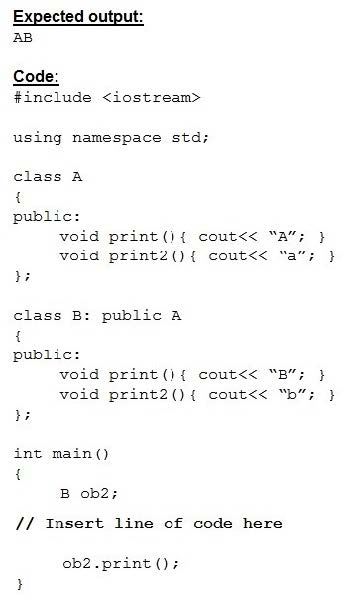Exam Details
Exam Code
:CPA-21-02Exam Name
:CPA - C++ Certified Associate ProgrammerCertification
:C++ Institute CertificationsVendor
:C++ InstituteTotal Questions
:257 Q&AsLast Updated
:Jul 18, 2025
C++ Institute C++ Institute Certifications CPA-21-02 Questions & Answers
-
Question 221:
Which code line inserted instead of the comment below will cause the program to produce the expected output?

A. ob2.A::print();
B. ob2 ?gt; A::print();
C. ob2.B::print();
D. ob2 ?gt; B::print();
-
Question 222:
Which of the following is a correct way to define the function fun() in the program below?
#include
#include
#include
using namespace std;
int main()
{
int a[2][2];
fun(a);
return 0;
}
A. void fun(int *p[2]) {}
B. void fun(int *p[2][2]) {}
C. void fun(int *p[][2]) {}
D. void fun(int p[][2]) {}
-
Question 223:
What happens when you attempt to compile and run the following code?
#include
using namespace std;
class Base {
static int age;
public:
Base () {};
~Base () {};
void setAge(int a=20) {age = a;}
void Print() { cout << age;}
};
int Base::age=0;
int main () {
Base a;
a.setAge(10);
a.Print();
a.setAge();
a.Print();
return 0;
}
A. It prints: 10
B. It prints: 20
C. It prints: 1020
D. It prints: 2010
-
Question 224:
What happens when you attempt to compile and run the following code?
#include
#include
using namespace std;
int main()
{
string s1[]= {"H" , "t" };
string s;
for (int i=0; i<2; i++) {
s = s1[i];
s.insert(1,"o");
cout << s;
}
return( 0 );
}
A. It prints: Hoto
B. It prints: Ho
C. It prints: to
D. It prints: Ht
-
Question 225:
What happens when you attempt to compile and run the following code?
#include
using namespace std;
class First
{
public:
virtual void Print(){ cout<<"from First";}
};
class Second:public First
{
public:
void Print(){ cout<< "from Second";}
};
void fun(First *obj);
int main()
{
First FirstObject;
fun(andFirstObject);
Second SecondObject;
fun(andSecondObject);
}
void fun(First *obj)
{
obj?>Print();
}
A. It prints: from First
B. It prints: from Firstfrom First
C. It prints: from Firstfrom Second
D. It prints: from Secondfrom Second
-
Question 226:
What happens when you attempt to compile and run the following code?
#include
using namespace std;
int main()
{
union un
{
int x;
char c;
};
union un u1 = {10};
union un u2 = {'a'};
union un u3 = {20, 'a'};
cout<
cout<
cout<
return 0;
}
A. It prints: 10aa
B. It prints: 10a20a
C. It prints: 1a
D. Compilation error
-
Question 227:
What happens when you attempt to compile and run the following code?
#include
using namespace std;
int fun(int x) {
return 2*x;
}
int main(){
int i;
i = fun(1) || fun(2);
cout << i;
return 0;
}
A. It prints: 0
B. It prints: 1
C. It prints: -1
D. Compilation error
-
Question 228:
Which of the following statements are true? (Choose two.)
A. Class A's friend's friend is also a friend of class A
B. Friendship is inherited
C. A class may be a friend of many classes
D. A class may have many friends
-
Question 229:
What happens when you attempt to compile and run the following code?
#include
using namespace std;
namespace myNamespace1
{
int x = 5;
int y = 10;
}
namespace myNamespace2
{
float x = 3.14;
float y = 1.5;
}
int main () {
namespace newname = myNamespace1;
using namespace newname;
cout << x << " ";
cout << y;
return 0;
}
A. It prints: 5 1.5
B. It prints: 3.14 1.5
C. It prints: 5 10
D. It prints: 5
-
Question 230:
What is not inherited from the base class?
A. constructor
B. destructor
C. operator=()
D. operator+()
Tips on How to Prepare for the Exams
Nowadays, the certification exams become more and more important and required by more and more enterprises when applying for a job. But how to prepare for the exam effectively? How to prepare for the exam in a short time with less efforts? How to get a ideal result and how to find the most reliable resources? Here on Vcedump.com, you will find all the answers. Vcedump.com provide not only C++ Institute exam questions, answers and explanations but also complete assistance on your exam preparation and certification application. If you are confused on your CPA-21-02 exam preparations and C++ Institute certification application, do not hesitate to visit our Vcedump.com to find your solutions here.